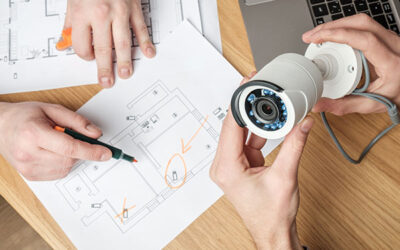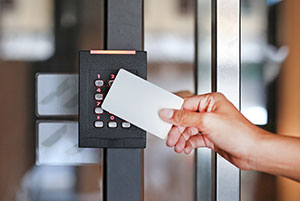So, you’ve decided it’s finally time to install a security system in your home or business. But now, you’ve found you have a fresh conundrum: deciding which type of security system you actually need. With so many types of security systems out there, and so many overlapping names and categories, it’s totally understandable that consumers can get a little lost.
In an effort to remedy this, we’ve put together this comprehensive guide to the main types of security systems. You’ll not only learn the key differences between the main kinds of security systems but how to decide which is best for securing your property.
With that in mind, let’s dive right in!
What Are The 4 Types of Security Systems?
Let’s kick things off with a brief overview of the 4 types of security systems and the main functions they all share.
What Are the Main Types of Security Systems?
The main types of security systems are:
- Monitored security systems: which can be company-monitored or self-monitored
- Unmonitored security systems
- Wired security systems
- Wireless security systems
What Are the Main Functions of a Security System?
The overall function of a security system depends on the property on which it’s installed and the reasons the property owner installed it. This could range from keeping a watchful eye over or protecting possessions in a residential property or surveillance staff or ensuring customer safety in a commercial property. That being said, security systems have particular functionality in common, including:
- To Deter: Discouraging criminals from targeting your property because there’s a higher chance they’ll be caught.
- To Alert: Letting you, or the security professionals looking after your property, know that a potential incident is taking place. Depending on the type of security system, you can also be made aware of exactly where on your property the event is taking place.
- To document: Recording video, or picture, footage of an event, such as a burglary, so you can pass it on to authorities in hope of catching the criminals responsible.
Monitored Security Systems
Let’s now look at each type of security system in greater detail, starting with monitored security systems.
What Is a Company-Monitored Security System?
A company monitored system is a security system that’s being watched over by a professional security company. The security company will also act on your behalf if there’s an incident, as indicated by a sensor being triggered or if something is spotted on your security cameras.
What Is a Self-Monitored Security System?
In contrast, a self-monitored system is a security system that the owner of a property is required to watch over themselves. Subsequently, they’re also responsible for taking action, i.e., calling the police, if they notice something suspicious on their property.
How Does a Monitored Security System Work?
Both company-monitored and self-monitored security systems work by transmitting an alarm triggered event, whether that be via an alarm system or camera system, on which it can be viewed and actioned. The key difference is where this information is transmitted.
With a company-monitored security system, the alert is transmitted to monitors back at the security company’s base – which is also why they’re known as back-to-base security systems. In the event of an alarm going off at your property, the security personnel surveilling your property will call you, i.e., a verification call, to check if the alarm is triggered by mistake. If it wasn’t a mistake, don’t answer your phone, or do answer and don’t respond (indication of duress), the security company will dispatch security guards or call the police to further investigate.
In the case of self-monitored security systems, the alert is usually transmitted to your mobile device: be it a smartphone or tablet. You can then view the information through an app on your mobile device. The security alert can be in real-time. Both types of monitored security systems will feature a variety of sensors and alarms, including motion detectors and glass break alarms and/or security cameras.
What Are the Pros and Cons of Monitored Security Systems?
Now, let’s compare the pros and cons of each typed of company-monitored security system.
Company-monitored security systems
Pros
- A professional security company is keeping an eye on your property 24/7.
- The security personnel have experience making decisions under pressure. Plus, they have distance from the situation and aren’t susceptible to the fear that comes with, even potentially, having an intruder on site.
- Someone will check on your property if you’re not home or unreachable.
- The security company monitoring your property will professionally install the security system for you, ensuring maximum effectiveness.
- An alarm system is connected “back to base” via the mobile network or your internet, so can still function in the case of a power outage. The alarm will revert to the alarms back up battery. If it is reporting via your internet, you will need to ensure you install a UPS (uninterrupted power supply) to your router in the event of a power outage. Same with a camera system, this can only be viewed over your internet so it is imperative you have back up power such as a UPS for the recorder and your router.
Cons
- Professional installation of security system costs more.
- Company monitoring requires a monthly subscription.
- Many security companies charge a false alarm fee for unnecessary callouts however this can be minimised by only sending patrol on multiple alarm events and not a single/restore activation. You can also nominate to only send a patrol if a keyholder authorises to do so.
Self-monitored security systems
Pros
- You can receive real-time footage or notifications when an alarm sensor is triggered.
- You can view your cameras from your smart phone if you have internet at the premise.
- Cost-effective: can get started with a few security devices in the property’s most vulnerable areas and progressively add more.
- Portable: wireless options allow you to relocate security components to other areas or a new property. This makes them especially handy for renters.
Cons
- You’re responsible for keeping an eye on your property – and for making decisions on when to involve authorities, etc.
- You may have to be the one to attend your site after a potential break and enter.
- You have to install the security system yourself.
- Self-monitored security systems require a WIFI connection to work; meaning they will not function in the of a power outage or your internet goes down.
- We highly recommend installing a UPS (uninterrupted power supply) to your router. This won’t however combat any internet drop outs which will leave your security vulnerable.
- You might not receive a notification in time if you’re in an area with a poor signal & you will have no back up.
Unmonitored Security Systems
Now that we’ve covered both types of monitored security systems, let’s travel to the other end of the spectrum and look at unmonitored systems.
What Is an Unmonitored Security System?
An unmonitored security system is a system that doesn’t report back to any base and won’t allow you to monitor the recorded footage in real-time from a smart phone app. Instead, these security systems emphasise deterrence with alarms, sirens, and even programmable audio messages to ward off intruders. They are traditionally called a local alarm system only as they do not alert anyone in the event of a trigger. If you have WiFi and internet at your premise and on your smart phone, the latest systems can be set up to report to the app on your phone.
What Are the Key Features of This System?
- Activation keypads
- Alarms: sirens, audio message
- Sensors: Window break alarms, door and window open sensors, motion detection sensors
- Camera footage can record back to a main recorder on site.
Are Unmonitored Security Systems Less Capable Than Monitored Systems?
In general, a monitored system is a better choice – because it provides you with more information and, therefore, gives you more options in the event there is an intruder on your property. So, technically, yes unmonitored security systems are less capable than monitored security systems. That being said, unmonitored systems are useful in certain circumstances, such as:
- People on a very tight budget
- The site has no internet connection
- Living in a low crime area.
Wired Security Systems
Ok, now that you know the difference between monitored and unmonitored security systems, let’s switch gears and look at wired security systems.
What Is a Wired Security System?
A wired security system is one in which all its components are connected by low-voltage wiring and cables. Devices like cameras, motion detectors, digital video recorders, keypads, etc., are connected to a central control panel, which is usually connected to the internet with an Ethernet cable or WiFi extender.
What Are the Pros and Cons of a Wired Security System?
Pros
- Consistent power source
- Consistent internet connection
- Camera footage is recorded and stored on site on the NVR (locked away). No cloud storage fees.
- Alarm devices instantly restore after a trigger in readiness for the next trigger alert (wireless have to reset before tripping again and this takes some time)
- A more stable connection than wireless systems because the main control panel knows the real-time status of each component device within the system.
- No ongoing battery changing costs to each device
Cons
- More time-consuming to install: unless you want loose cables dangling everywhere, you have to secure and fasten all the wiring to Australian Standards
- Installation sometimes can cost a little more depending on your site
- Usually requires drilling: which isn’t feasible for many renters
Is It Possible to Install a Wireless Security System Alongside an Existing Wired System?
It is indeed possible to install a wireless security system alongside an existing wired one. Security systems that contain both wired and wireless components are known as hybrid security systems, and we’ll take a look at them a little later.
Wireless Security Systems
Now, we come to the 4th of the four main types of security systems: wireless security systems.
What Is a Wireless Security System?
A wireless security system is one in which its components, from cameras to sensors, are connected to a panel or recorder via radio signals. However, a wireless security system is rarely completely wireless: the vast majority have plug-in central control panels. Additionally, in the name of not having to frequently change batteries, it’s pretty common for security cameras in wireless systems to be plug-in too. Some security camera systems can be purely battery operated and sit on your Wi-Fi for remote viewing. They do however require a monthly subscription for your footage to be stored in a cloud.
Does a Wireless Security System Need an Internet Connection?
A solid, reliable internet connection is a key requirement of a wireless internet connection. The system needs to be connected to the internet to be able to send you real-time notifications if a sensor is triggered. On a similar note, you also need a signal to receive notifications when they’re sent, so if you’re in an area with a low connection, you may not get them in time to act.
What Are the Pros and Cons of a Wireless Security System?
Pros
- Simple to install
- Portable
- No wires to worry about and no need for drilling; so, great for renters.
Cons
- Need to have a strong WIFI connection.
- Susceptible to power outages
- For wireless security cameras, you’ll frequently need to change batteries
- Can be susceptible to electromagnetic from other devices, like baby monitors, remote controls, microwave ovens, etc.
What is a Hybrid Security System?
A hybrid security system is a wired system that also utilises some wireless security components like cameras and sensors. Typically, a wireless receiver is added to a wired security system so it can support wireless sensors such as Cameras, PIRs, Reeds, Remotes and Glass breaks. Also, as alluded to above, technically, most wireless security systems are really hybrid systems, as they have wired components like their main control panel, sirens and keypads. Security cameras for hard-to-reach places with cable, can be connected via a wireless bridge however the receiver still requires power.
The advantage of a hardwired system means you can have hardwired for majority of the areas of your property but not miss out on installing the wireless devices to cover hard to reach areas.
How To Choose the Security System That’s Best for You
So, now you know more about the main types of security systems, the question is, how do you choose the one that’s best for you? Here are some of the criteria for choosing the ideal security system for your home or business.
What Is the Security System’s Purpose?
The more important the purpose of a security system is, the more comprehensive and full-proof it needs to be. Here are a few considerations to keep in mind when it comes to the purpose of your security system.
- Will your security system be installed in your home or business?
- What’s the total value of the goods you have on-site?
The more valuable the goods on the premises, the better your security needs to be. This is especially the case with security for your business, that not only has lots of products on-site but cash too. However, by the same logic, the more treasured possessions you and your family have in their home, the more functional your security system should be. From our experience, criminals don’t just steal, they damage a lot of unnecessary equipment and furniture during the experience and in some cases try and light fires before leaving.
Do you have a family to protect?
Particularly, young children and elderly relatives – and let’s not forget our furry family either!
How Big Is Your Property?
The bigger your property, the vulnerabilities it has – as there are more places for criminals to sneak into and more places for them to hide as they attempt to gain access.
- Does your property have isolated areas like barns or sheds?
- Do you have a garage through which a burglar could gain access to your home?
- Do you have multiple properties?
If so, is it feasible for you to properly watch over them all yourself?
Do You Own or Rent Your Property?
Whether you own or rent your home, and the extent you’re allowed to renovate your rental, help determine the best type of security system that’s best for you.
Budget
The higher your budget for installing a security system, the more choices you have. While if you only have a small amount to get your security system going, you might have to start with a simple unmonitored or wireless security system. That being said, when it comes to your budget, there are two important things to keep in mind:
1.Something is always better than nothing – it will act as a deterrent if nothing else. You’d be surprised how far a few well-placed warning stickers can take you!
2.Installing a security system can land you lower home or business insurance payments – meaning the system essentially pays for itself over time.
How Often Are You Home?
The more often you’re away from home, the more robust your security set-up needs to be. Being out of the house a lot gives opportunistic criminals more chances to break in – some may even observe your habits for a while to learn when you’re away. Consequently, the more you’re away, the more a company-monitored system makes sense.
However, if you go down the self-monitoring route, it’s best to go for a wired solution, as it’s less susceptible to power outages and needs less maintenance, e.g., changing the batteries.
So, to cap this post off, let’s recap the four main types of security systems:
- Monitored security systems (company-monitored or self-monitored)
- Unmonitored security systems
- Wired security systems
- Wireless security systems (very few are completely wireless)
We hope this post has helped to clear up the differences between the main types of security systems. More importantly, we hope we’ve given you a much better idea of the kind of security system that best matches the needs of your home or business.
However, if you fancy a little help from some experienced security professionals or, better still, a free onsite quote for a security system, please get in touch.




